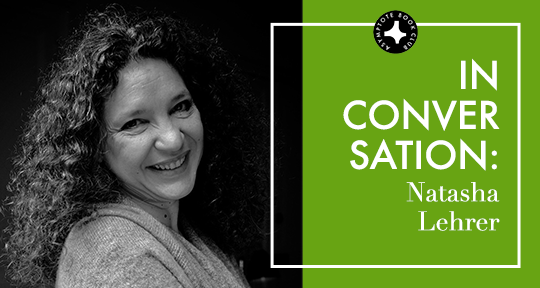On the Isle of Antioch is lauded Lebanese-French author Amin Maalouf’s philosophically rich take on the end-of-days novel. Told through the journals of Alexander, an artist living out his days on an island he shares with only one other person, this solitary existence is suddenly upended by a total communications blackout and power failure, followed by growing threats of global nuclear warfare. Through this narrative that builds on our contemporary forebodings, Maalouf weaves in the grand resonances of history and delicate moments of human connection to gather the touchpoints between consciousness and civilization, reality and belief. Skillfully taken into English by award-winning translator Natasha Lehrer, this modern myth was our final Book Club selection for 2023, and in the interview below, we speak to Lehrer about On the Isle of Antioch’s massive range, the novelist’s role, and the importance of ambiguity.
The Asymptote Book Club aspires to bring the best in translated fiction every month to readers around the world. You can sign up to receive next month’s selection on our website for as little as USD20 per book; once you’re a member, join our Facebook group for exclusive book club discussions and receive invitations to our members-only Zoom interviews with the author or the translator of each title.
Ruwa Alhayek (RA): On the Isle of Antioch resonates strongly with contemporary events like the COVID pandemic or current geopolitical tensions; it’s intriguing how the novel captures such fears, then deviates from initial impressions. Did ongoing events have an impact on your process of translation?
Natasha Lehrer (NL): The narrative absolutely echoes real-world concerns like the Ukrainian invasion and geopolitical tensions between the U.S., Iran, Armenia, and Azerbaijan. Sardar Sardarov initially appears as a Central Asian warlord, a nod to figures from the former Soviet Union. The theme of missing nuclear warheads also aligns with post-Soviet anxieties, cleverly naming and then subverting those fears.
But personally, translation is more of an intellectual exercise for me. I focus on achieving the right tone and voice for characters, especially when translating philosophical dialogues. For instance, translating an American character from French back into English is quite interesting, and Maalouf’s characters often speak in a philosophical manner rather than realistic dialogue. Reading the novel again after a year, I’m struck by the atmosphere of dread, fear, and eroticism. It’s exciting to realize that it works well, even though I wasn’t consciously conjuring specific atmospheres during translation. It’s more about accurately conveying Maalouf’s ideas. READ MORE…

